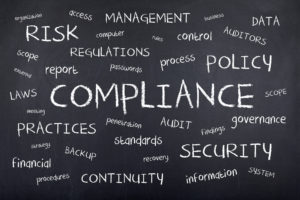Optimise Effectiveness In The Compliance Sector
The Compliance function has come a long way over the last decade. It has evolved rapidly to keep pace with the digital transformation of business and has become more agile to better respond to emerging situations. Rather than being a static annual risk assessment, compliance is now an ongoing and dynamic process that is sensitive to evolving risks and stress points.

Here are six of the key compliance trends for 2018:
Technology
The last decade saw a rapid increase in the number of compliance professionals to tackle newer threats, although that growth seems to have stabilised to an extent. The focus is now on creating better tools for these compliance professionals and establishing more effective procedures, communication channels, monitoring techniques and so on.
Training
The emphasis is shifting from quantity to quality. Organisations are seeking experienced compliance professionals and are more than willing to bear the additional cost of providing the best compliance training opportunities to their existing staff.
Data quality and assessment capability
Moving to digital processes means that organisations generate a tremendous amount of additional data. This data can be indispensable not only from a business standpoint but for compliance and risk management as well. However, the challenge here is to ensure that the data is of high quality and usable. This requires expertise and investments in data analysis.
Emerging risks such as cyber crime, fraud, and financial crime
However, there are newer risks on the horizon as well – such as those emerging from the use of virtual currencies or artificial intelligence.
Regtech
The use of RegTech platforms can not only help reduce compliance costs, but also assist in finding threats that otherwise would have remained unseen. For transaction-heavy business, RegTech tools can provide near-instantaneous fraud detection and help companies reduce losses from fraud and unauthorised access. RegTech remains a top area of focus for companies, developers and regulators alike.

Continuous compliance
Rather than monitoring thresholds at set intervals, compliance tools can act as surveillance systems that continuously monitor the environment and raise an alarm when anything seems out of place. This is especially useful in today’s fast-paced business environment where a breach or error can cripple a business in a matter of hours.
Conclusion
The compliance function has not only evolved with technology, but it has also grown in its role. Rather than being just an advisory function, it is now right at the vanguard – protecting businesses from all sorts of risks. With the digital transformation of business, compliance departments have had to become more agile and responsive, in addition to being thorough and meticulous. The focus now is on meeting new challenges in a cost-effective manner and using technological tools, bespoke employee training, and RegTech innovations to optimise the compliance function.
Submit Your CV, or Search Jobs to find out about the roles we currently have available.
Send Us Your Vacancy and one of our consultants will be in contact to discuss your requirements and how we may assist.
Our Renaix Guide to Governance, Risk, Compliance and Internal Controls provides information on trends in the industry.
Similar posts:
How is Corporate Governance Preparing for the Future, Back to Basics in Reg Tech Solutions, The Top Ways to Succeed in Governance, Risk and Compliance.
Job Seekers
On the hunt for your next role? Upload your CV below and we’ll be in touch to discuss your requirements.
Employers
For employers seeking the right skills and cultural fit for your business, send us your vacancy to find out more about how we can help.
Submit CV Send Us Your VacancySearch Jobs
Popular this week
- What Qualifications And Skills Are Needed To Be An Accountant?
- How Does Industry 4.0 Differ From The Previous Generation?
- Agile For Accountants: Six Steps To Provide Necessary Tools And Relevant Processes
- What Are The Main Differences Between ACA and ACCA?
- What Are The Top Five Financial Accounting Facts For #AccountantsDay